Reflective Analysis: Medication Administration in Clinical Practice
VerifiedAdded on 2023/06/05
|5
|937
|71
AI Summary
This paper reflects on clinical practice experiences related to medication administration using Gibbs Reflective Cycle. It discusses an instance where the author failed to inquire about a patient's allergies and chronic illnesses before administering diclofenac, leading to gastric irritation due to the patient's peptic ulcer disease. It contrasts this with a positive observation of a student adhering to insulin administration guidelines, including site rotation. Conversely, it critiques another student's poor practice during an intramuscular morphine injection. The reflection concludes with an action plan focused on thorough patient history review and enhanced pharmacological knowledge to improve future medication administration practices and patient safety. Desklib provides a platform for students to access past papers and solved assignments.
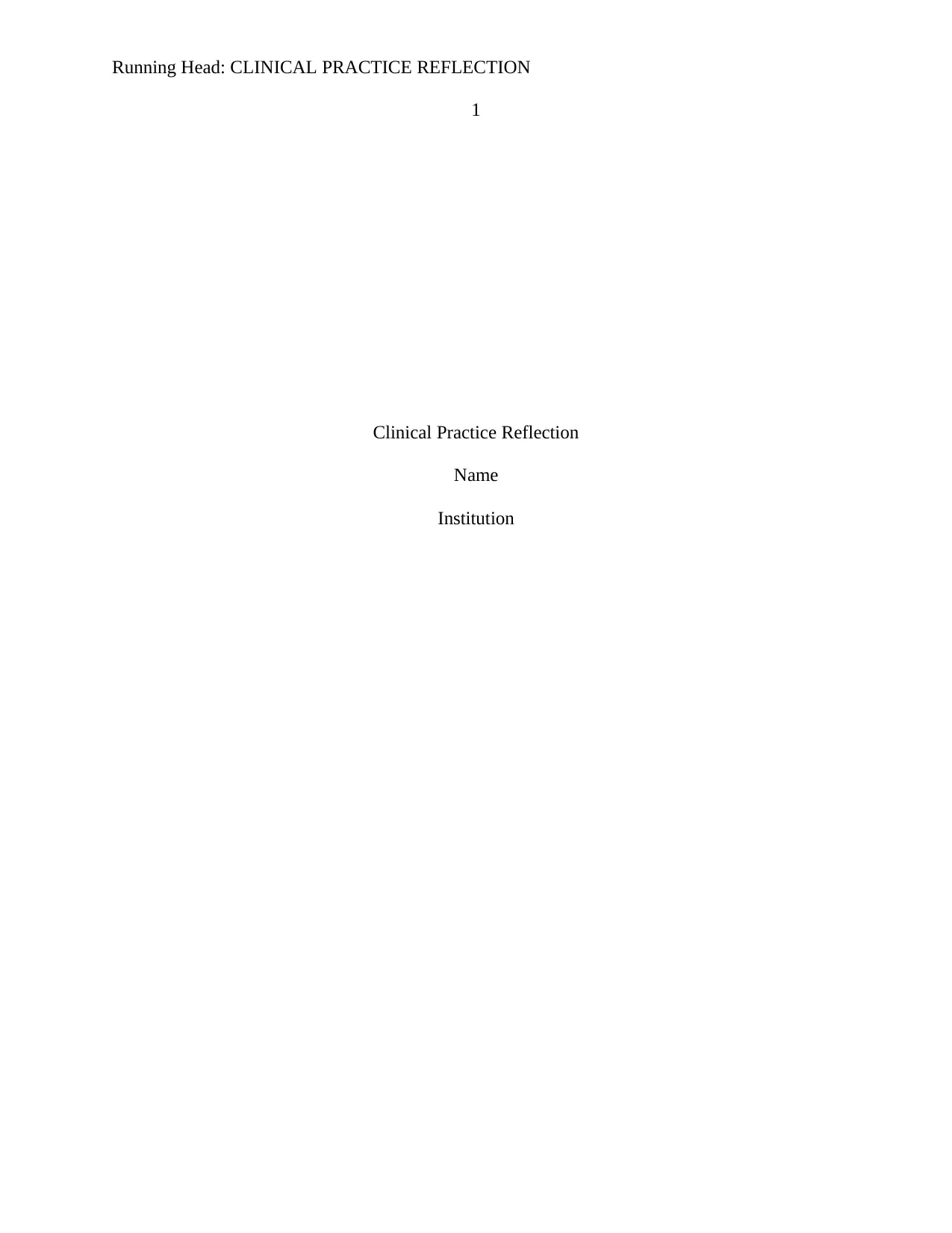
Running Head: CLINICAL PRACTICE REFLECTION
1
Clinical Practice Reflection
Name
Institution
1
Clinical Practice Reflection
Name
Institution
Paraphrase This Document
Need a fresh take? Get an instant paraphrase of this document with our AI Paraphraser
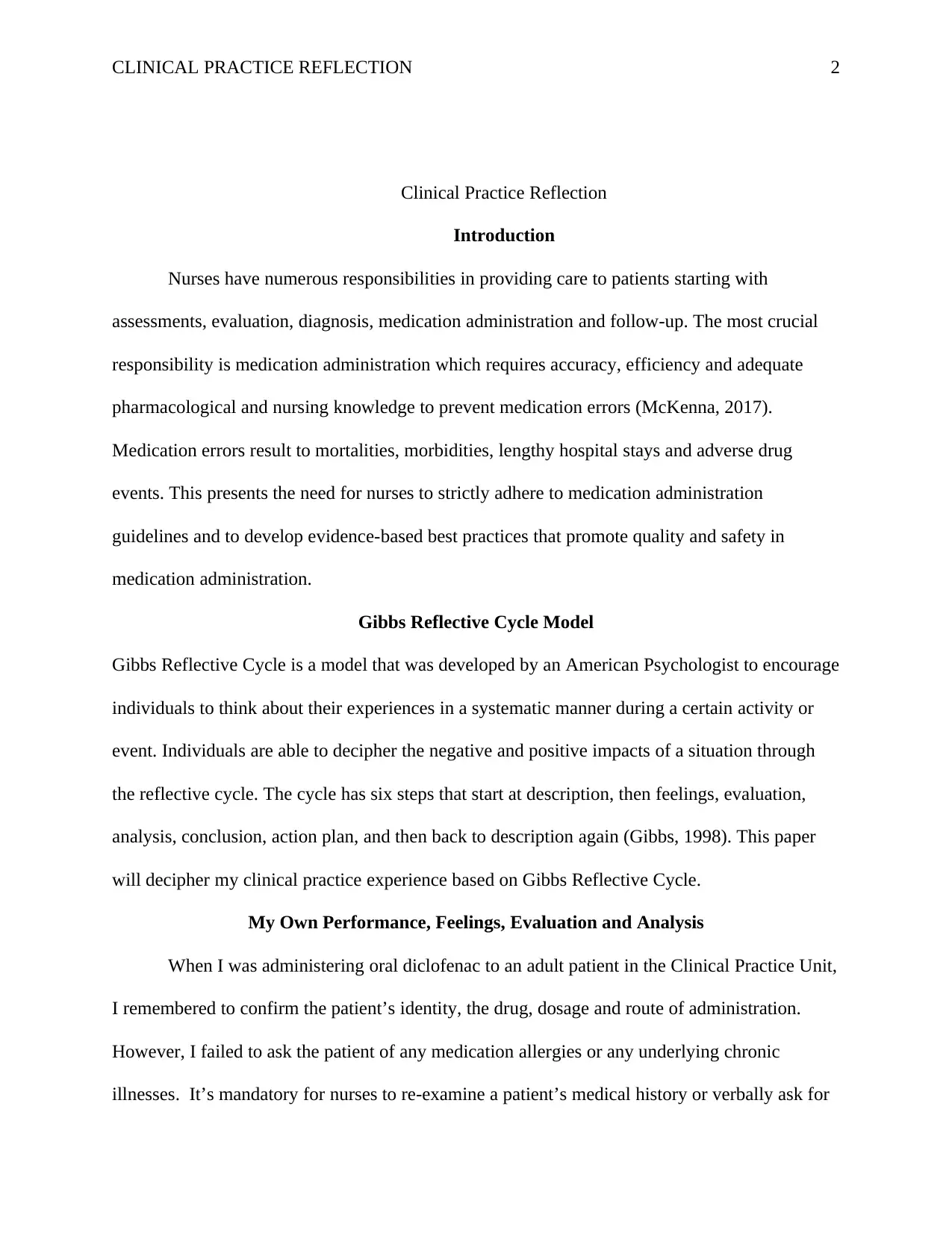
CLINICAL PRACTICE REFLECTION 2
Clinical Practice Reflection
Introduction
Nurses have numerous responsibilities in providing care to patients starting with
assessments, evaluation, diagnosis, medication administration and follow-up. The most crucial
responsibility is medication administration which requires accuracy, efficiency and adequate
pharmacological and nursing knowledge to prevent medication errors (McKenna, 2017).
Medication errors result to mortalities, morbidities, lengthy hospital stays and adverse drug
events. This presents the need for nurses to strictly adhere to medication administration
guidelines and to develop evidence-based best practices that promote quality and safety in
medication administration.
Gibbs Reflective Cycle Model
Gibbs Reflective Cycle is a model that was developed by an American Psychologist to encourage
individuals to think about their experiences in a systematic manner during a certain activity or
event. Individuals are able to decipher the negative and positive impacts of a situation through
the reflective cycle. The cycle has six steps that start at description, then feelings, evaluation,
analysis, conclusion, action plan, and then back to description again (Gibbs, 1998). This paper
will decipher my clinical practice experience based on Gibbs Reflective Cycle.
My Own Performance, Feelings, Evaluation and Analysis
When I was administering oral diclofenac to an adult patient in the Clinical Practice Unit,
I remembered to confirm the patient’s identity, the drug, dosage and route of administration.
However, I failed to ask the patient of any medication allergies or any underlying chronic
illnesses. It’s mandatory for nurses to re-examine a patient’s medical history or verbally ask for
Clinical Practice Reflection
Introduction
Nurses have numerous responsibilities in providing care to patients starting with
assessments, evaluation, diagnosis, medication administration and follow-up. The most crucial
responsibility is medication administration which requires accuracy, efficiency and adequate
pharmacological and nursing knowledge to prevent medication errors (McKenna, 2017).
Medication errors result to mortalities, morbidities, lengthy hospital stays and adverse drug
events. This presents the need for nurses to strictly adhere to medication administration
guidelines and to develop evidence-based best practices that promote quality and safety in
medication administration.
Gibbs Reflective Cycle Model
Gibbs Reflective Cycle is a model that was developed by an American Psychologist to encourage
individuals to think about their experiences in a systematic manner during a certain activity or
event. Individuals are able to decipher the negative and positive impacts of a situation through
the reflective cycle. The cycle has six steps that start at description, then feelings, evaluation,
analysis, conclusion, action plan, and then back to description again (Gibbs, 1998). This paper
will decipher my clinical practice experience based on Gibbs Reflective Cycle.
My Own Performance, Feelings, Evaluation and Analysis
When I was administering oral diclofenac to an adult patient in the Clinical Practice Unit,
I remembered to confirm the patient’s identity, the drug, dosage and route of administration.
However, I failed to ask the patient of any medication allergies or any underlying chronic
illnesses. It’s mandatory for nurses to re-examine a patient’s medical history or verbally ask for
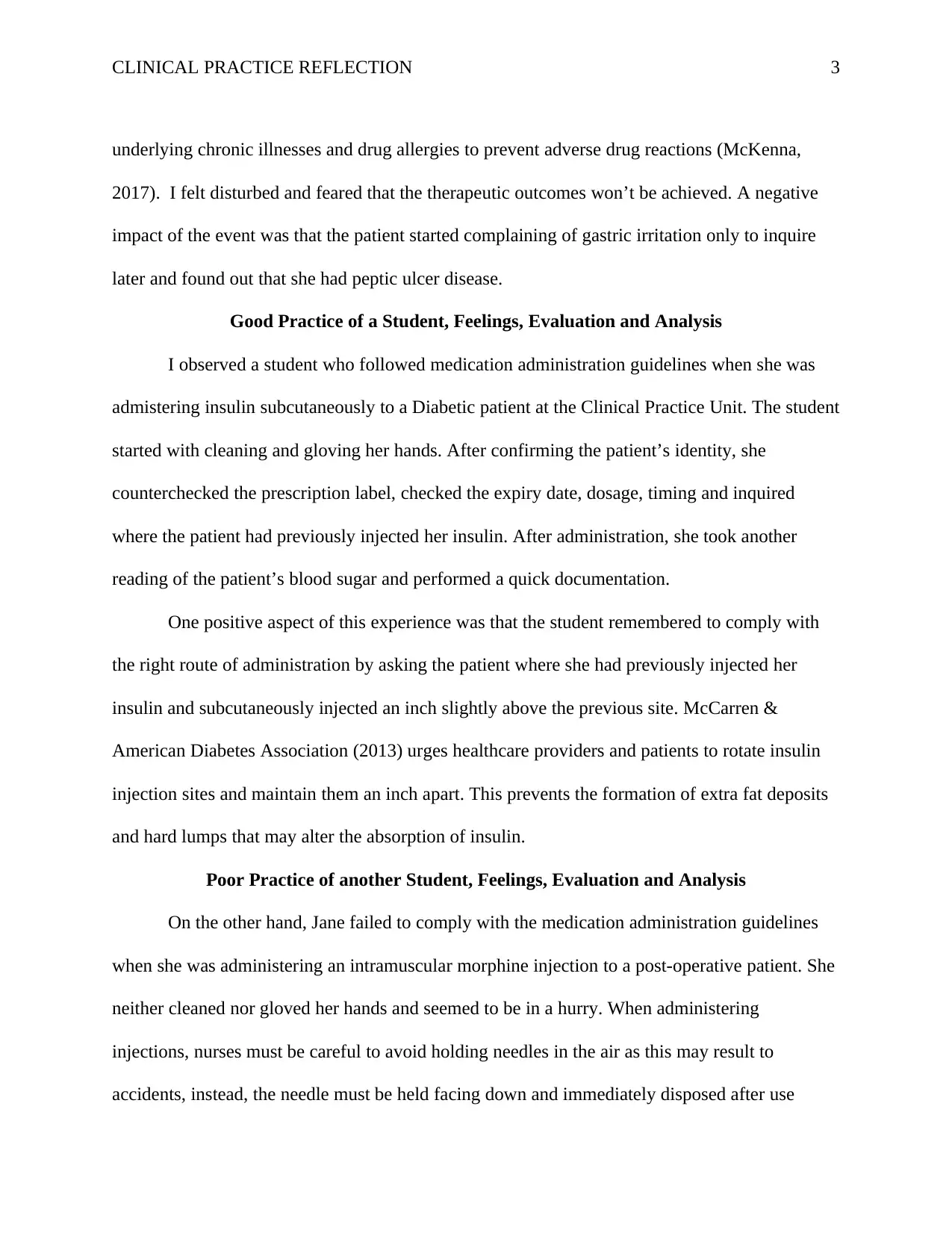
CLINICAL PRACTICE REFLECTION 3
underlying chronic illnesses and drug allergies to prevent adverse drug reactions (McKenna,
2017). I felt disturbed and feared that the therapeutic outcomes won’t be achieved. A negative
impact of the event was that the patient started complaining of gastric irritation only to inquire
later and found out that she had peptic ulcer disease.
Good Practice of a Student, Feelings, Evaluation and Analysis
I observed a student who followed medication administration guidelines when she was
admistering insulin subcutaneously to a Diabetic patient at the Clinical Practice Unit. The student
started with cleaning and gloving her hands. After confirming the patient’s identity, she
counterchecked the prescription label, checked the expiry date, dosage, timing and inquired
where the patient had previously injected her insulin. After administration, she took another
reading of the patient’s blood sugar and performed a quick documentation.
One positive aspect of this experience was that the student remembered to comply with
the right route of administration by asking the patient where she had previously injected her
insulin and subcutaneously injected an inch slightly above the previous site. McCarren &
American Diabetes Association (2013) urges healthcare providers and patients to rotate insulin
injection sites and maintain them an inch apart. This prevents the formation of extra fat deposits
and hard lumps that may alter the absorption of insulin.
Poor Practice of another Student, Feelings, Evaluation and Analysis
On the other hand, Jane failed to comply with the medication administration guidelines
when she was administering an intramuscular morphine injection to a post-operative patient. She
neither cleaned nor gloved her hands and seemed to be in a hurry. When administering
injections, nurses must be careful to avoid holding needles in the air as this may result to
accidents, instead, the needle must be held facing down and immediately disposed after use
underlying chronic illnesses and drug allergies to prevent adverse drug reactions (McKenna,
2017). I felt disturbed and feared that the therapeutic outcomes won’t be achieved. A negative
impact of the event was that the patient started complaining of gastric irritation only to inquire
later and found out that she had peptic ulcer disease.
Good Practice of a Student, Feelings, Evaluation and Analysis
I observed a student who followed medication administration guidelines when she was
admistering insulin subcutaneously to a Diabetic patient at the Clinical Practice Unit. The student
started with cleaning and gloving her hands. After confirming the patient’s identity, she
counterchecked the prescription label, checked the expiry date, dosage, timing and inquired
where the patient had previously injected her insulin. After administration, she took another
reading of the patient’s blood sugar and performed a quick documentation.
One positive aspect of this experience was that the student remembered to comply with
the right route of administration by asking the patient where she had previously injected her
insulin and subcutaneously injected an inch slightly above the previous site. McCarren &
American Diabetes Association (2013) urges healthcare providers and patients to rotate insulin
injection sites and maintain them an inch apart. This prevents the formation of extra fat deposits
and hard lumps that may alter the absorption of insulin.
Poor Practice of another Student, Feelings, Evaluation and Analysis
On the other hand, Jane failed to comply with the medication administration guidelines
when she was administering an intramuscular morphine injection to a post-operative patient. She
neither cleaned nor gloved her hands and seemed to be in a hurry. When administering
injections, nurses must be careful to avoid holding needles in the air as this may result to
accidents, instead, the needle must be held facing down and immediately disposed after use
⊘ This is a preview!⊘
Do you want full access?
Subscribe today to unlock all pages.

Trusted by 1+ million students worldwide
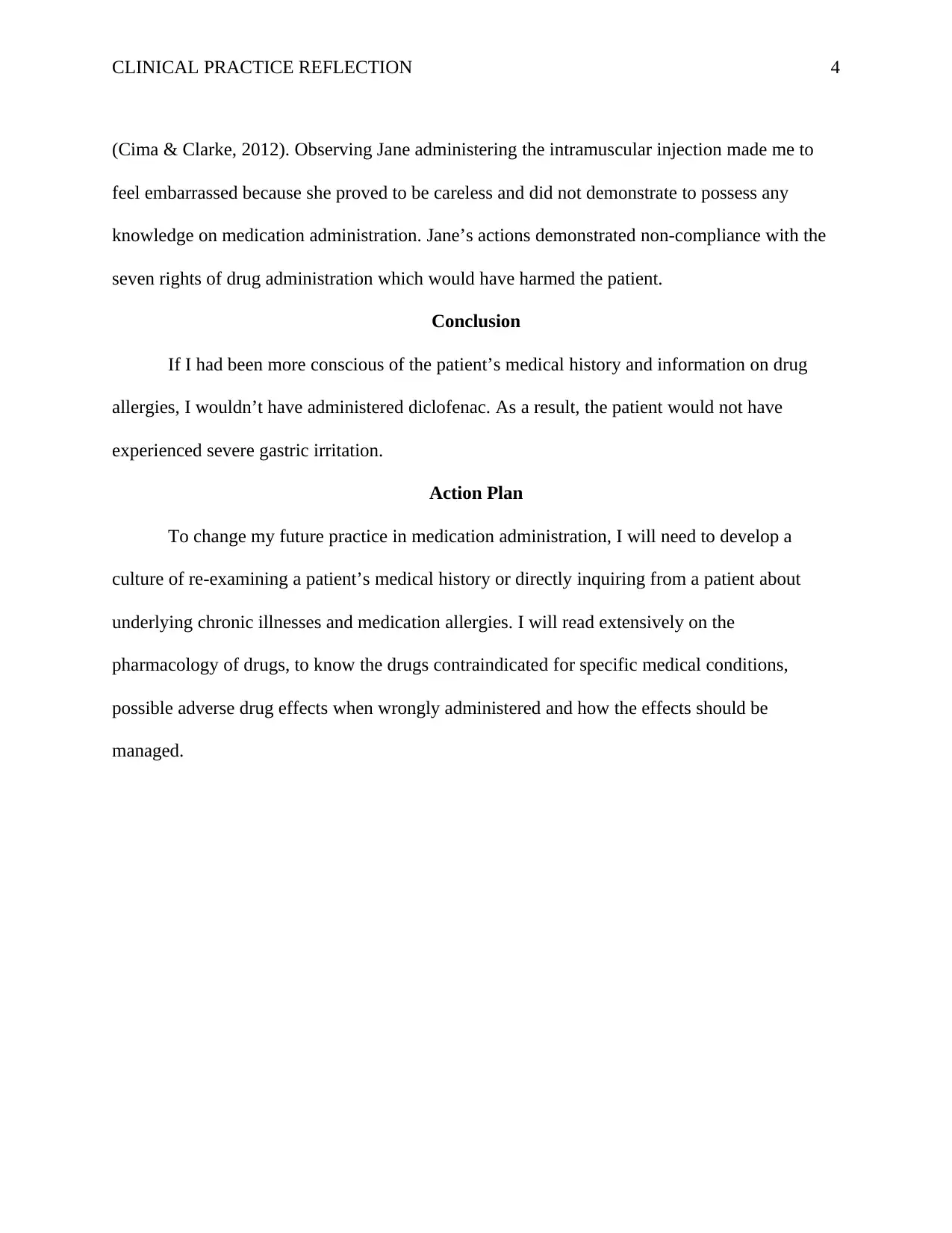
CLINICAL PRACTICE REFLECTION 4
(Cima & Clarke, 2012). Observing Jane administering the intramuscular injection made me to
feel embarrassed because she proved to be careless and did not demonstrate to possess any
knowledge on medication administration. Jane’s actions demonstrated non-compliance with the
seven rights of drug administration which would have harmed the patient.
Conclusion
If I had been more conscious of the patient’s medical history and information on drug
allergies, I wouldn’t have administered diclofenac. As a result, the patient would not have
experienced severe gastric irritation.
Action Plan
To change my future practice in medication administration, I will need to develop a
culture of re-examining a patient’s medical history or directly inquiring from a patient about
underlying chronic illnesses and medication allergies. I will read extensively on the
pharmacology of drugs, to know the drugs contraindicated for specific medical conditions,
possible adverse drug effects when wrongly administered and how the effects should be
managed.
(Cima & Clarke, 2012). Observing Jane administering the intramuscular injection made me to
feel embarrassed because she proved to be careless and did not demonstrate to possess any
knowledge on medication administration. Jane’s actions demonstrated non-compliance with the
seven rights of drug administration which would have harmed the patient.
Conclusion
If I had been more conscious of the patient’s medical history and information on drug
allergies, I wouldn’t have administered diclofenac. As a result, the patient would not have
experienced severe gastric irritation.
Action Plan
To change my future practice in medication administration, I will need to develop a
culture of re-examining a patient’s medical history or directly inquiring from a patient about
underlying chronic illnesses and medication allergies. I will read extensively on the
pharmacology of drugs, to know the drugs contraindicated for specific medical conditions,
possible adverse drug effects when wrongly administered and how the effects should be
managed.
Paraphrase This Document
Need a fresh take? Get an instant paraphrase of this document with our AI Paraphraser
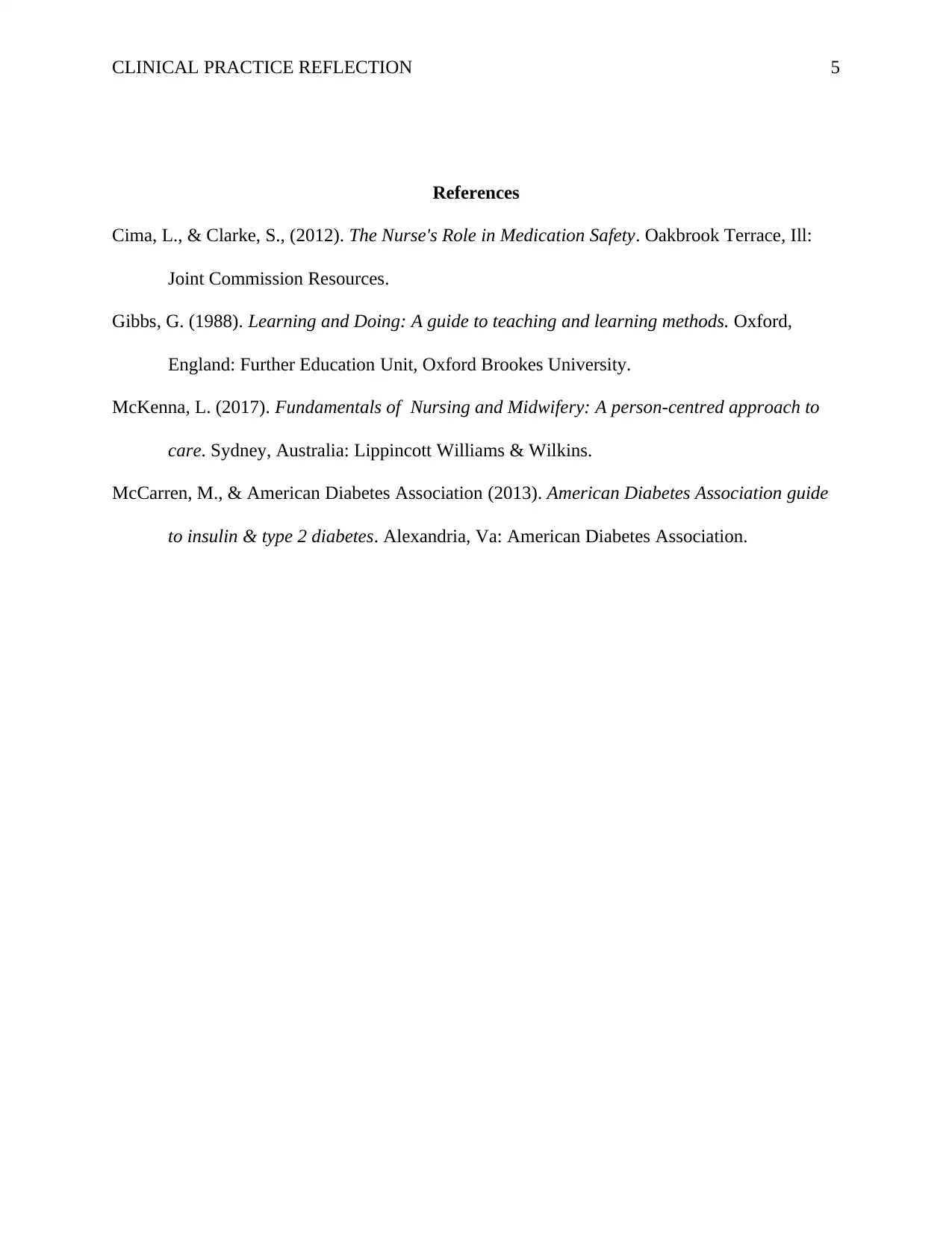
CLINICAL PRACTICE REFLECTION 5
References
Cima, L., & Clarke, S., (2012). The Nurse's Role in Medication Safety. Oakbrook Terrace, Ill:
Joint Commission Resources.
Gibbs, G. (1988). Learning and Doing: A guide to teaching and learning methods. Oxford,
England: Further Education Unit, Oxford Brookes University.
McKenna, L. (2017). Fundamentals of Nursing and Midwifery: A person-centred approach to
care. Sydney, Australia: Lippincott Williams & Wilkins.
McCarren, M., & American Diabetes Association (2013). American Diabetes Association guide
to insulin & type 2 diabetes. Alexandria, Va: American Diabetes Association.
References
Cima, L., & Clarke, S., (2012). The Nurse's Role in Medication Safety. Oakbrook Terrace, Ill:
Joint Commission Resources.
Gibbs, G. (1988). Learning and Doing: A guide to teaching and learning methods. Oxford,
England: Further Education Unit, Oxford Brookes University.
McKenna, L. (2017). Fundamentals of Nursing and Midwifery: A person-centred approach to
care. Sydney, Australia: Lippincott Williams & Wilkins.
McCarren, M., & American Diabetes Association (2013). American Diabetes Association guide
to insulin & type 2 diabetes. Alexandria, Va: American Diabetes Association.
1 out of 5
Related Documents
Your All-in-One AI-Powered Toolkit for Academic Success.
+13062052269
info@desklib.com
Available 24*7 on WhatsApp / Email
![[object Object]](/_next/static/media/star-bottom.7253800d.svg)
Unlock your academic potential
Copyright © 2020–2026 A2Z Services. All Rights Reserved. Developed and managed by ZUCOL.





